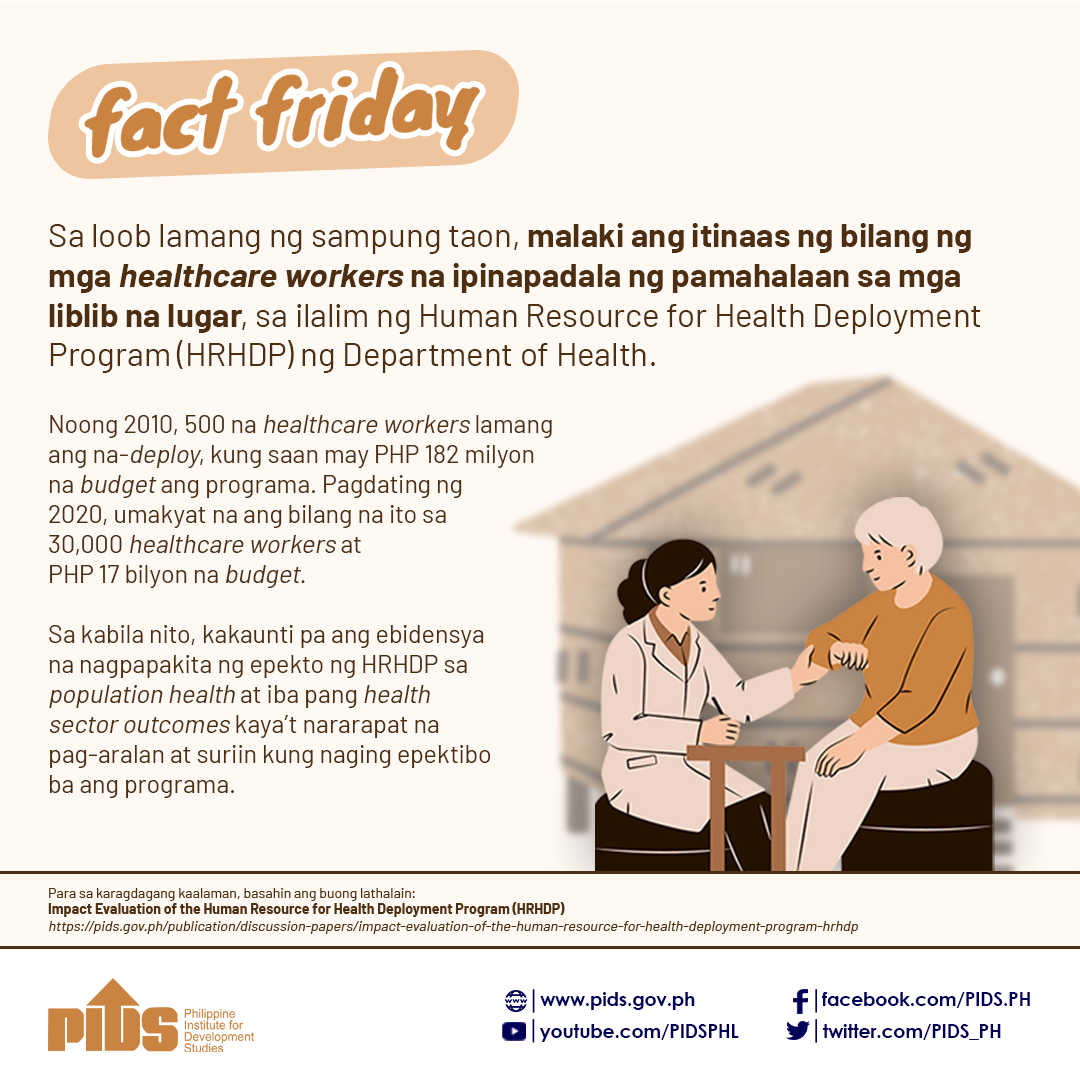The program of the Department of Health (DOH) to deploy workers in underserved areas needs to be strengthened to ensure that remote places get access to health services, according to a study released by the Philippine Institute for Development Studies (PIDS).
In a paper, titled “Process Evaluation of the Department of Health Human Resources for Health Deployment Program,” PIDS Research Fellow Michael R.M. Abrigo, Consultant Gina A. Opiniano, and Research Analyst Zhandra C. Tam said while aspects of the program are “laudable,” there’s still “room for improvement.”
This includes providing meals and transportation allowances for community visits and increasing incentives for health workers to encourage them to be deployed in these areas. They also said the program should have greater focus on areas that are underserved.
“The DOH-HRH [DOH-Health Resources for Health] deployment program has been deploying even in areas with high income, with high HRH-to-population ratio, and with relatively low poverty incidence,” the authors said.
“While this may be beneficial to receiving local governments and may promote political support to expand the national HRH deployment program, this nonetheless may be fiscally and operationally suboptimal,” they added.
The researchers found that among all respondents, 7.7 percent cited that they receive their monthly compensation less frequently than once a month.
Around 11.4 percent of nurses reported having higher prevalence of delayed receipts of monthly compensation compared to physicians at 6.1 percent.
Further, among nurses, only 5.7 percent of them received monthly compensation for meals; 8.6 percent for transportation; 2.9 percent for communication; and 2.9 percent for board and lodging.
Meanwhile, the researchers found that medical workers would be open to be deployed in remote areas with at least 100 percent to 150 percent of premium wages.
Data showed that doctors are more likely to accept deployment with at least 150 percent premium in wages, as well as some control over their places of assignment.
For nurses, they would be willing to accept deployment with at least 100 percent premium on wages, housing and travel allowance, control over their place of assignment, and training aligned with their continuing professional development (CPD).
For midwives, the researchers found that they are more likely to respond to provision of CPD-related training.
This despite the majority or 81.7 percent of deployed medical personnel expressed satisfaction with the monthly compensation they received.
However, the data showed satisfaction is much lower for other program benefits such as learning and development opportunities at 54.8 percent; monthly allowance/honorarium, 52.9 percent; funds, logistics and materials for programs/projects, 43.3 percent; board and lodging allowance, 36.5 percent; transportation allowance, 29.8 percent; meal allowance, 20.2 percent; and communication allowance, 20.2 percent.
“Program benefits that are necessary to provide health-care services, such as meals and transportation allowance during community visits, need to be provided, otherwise this negatively impacts the experience of deployed health-care workers, which reflect negatively on the program. In addition, delays in providing these benefits need to be resolved,” the researchers said.
The DOH has been helping augment the supply of health-care workers in underserved areas. This continued despite the devolution of health services under the Local Government Code in 1991.
In the past 10 years, the DOH-HRH deployment program has expanded to a massive program of about P10 billion that deployed almost 30,000 health-care workers in 2020.
Initially, the project only had a budgetary support of less than P200 million that deployed less than 500 health professionals in 2010.
In a paper, titled “Process Evaluation of the Department of Health Human Resources for Health Deployment Program,” PIDS Research Fellow Michael R.M. Abrigo, Consultant Gina A. Opiniano, and Research Analyst Zhandra C. Tam said while aspects of the program are “laudable,” there’s still “room for improvement.”
This includes providing meals and transportation allowances for community visits and increasing incentives for health workers to encourage them to be deployed in these areas. They also said the program should have greater focus on areas that are underserved.
“The DOH-HRH [DOH-Health Resources for Health] deployment program has been deploying even in areas with high income, with high HRH-to-population ratio, and with relatively low poverty incidence,” the authors said.
“While this may be beneficial to receiving local governments and may promote political support to expand the national HRH deployment program, this nonetheless may be fiscally and operationally suboptimal,” they added.
The researchers found that among all respondents, 7.7 percent cited that they receive their monthly compensation less frequently than once a month.
Around 11.4 percent of nurses reported having higher prevalence of delayed receipts of monthly compensation compared to physicians at 6.1 percent.
Further, among nurses, only 5.7 percent of them received monthly compensation for meals; 8.6 percent for transportation; 2.9 percent for communication; and 2.9 percent for board and lodging.
Meanwhile, the researchers found that medical workers would be open to be deployed in remote areas with at least 100 percent to 150 percent of premium wages.
Data showed that doctors are more likely to accept deployment with at least 150 percent premium in wages, as well as some control over their places of assignment.
For nurses, they would be willing to accept deployment with at least 100 percent premium on wages, housing and travel allowance, control over their place of assignment, and training aligned with their continuing professional development (CPD).
For midwives, the researchers found that they are more likely to respond to provision of CPD-related training.
This despite the majority or 81.7 percent of deployed medical personnel expressed satisfaction with the monthly compensation they received.
However, the data showed satisfaction is much lower for other program benefits such as learning and development opportunities at 54.8 percent; monthly allowance/honorarium, 52.9 percent; funds, logistics and materials for programs/projects, 43.3 percent; board and lodging allowance, 36.5 percent; transportation allowance, 29.8 percent; meal allowance, 20.2 percent; and communication allowance, 20.2 percent.
“Program benefits that are necessary to provide health-care services, such as meals and transportation allowance during community visits, need to be provided, otherwise this negatively impacts the experience of deployed health-care workers, which reflect negatively on the program. In addition, delays in providing these benefits need to be resolved,” the researchers said.
The DOH has been helping augment the supply of health-care workers in underserved areas. This continued despite the devolution of health services under the Local Government Code in 1991.
In the past 10 years, the DOH-HRH deployment program has expanded to a massive program of about P10 billion that deployed almost 30,000 health-care workers in 2020.
Initially, the project only had a budgetary support of less than P200 million that deployed less than 500 health professionals in 2010.












